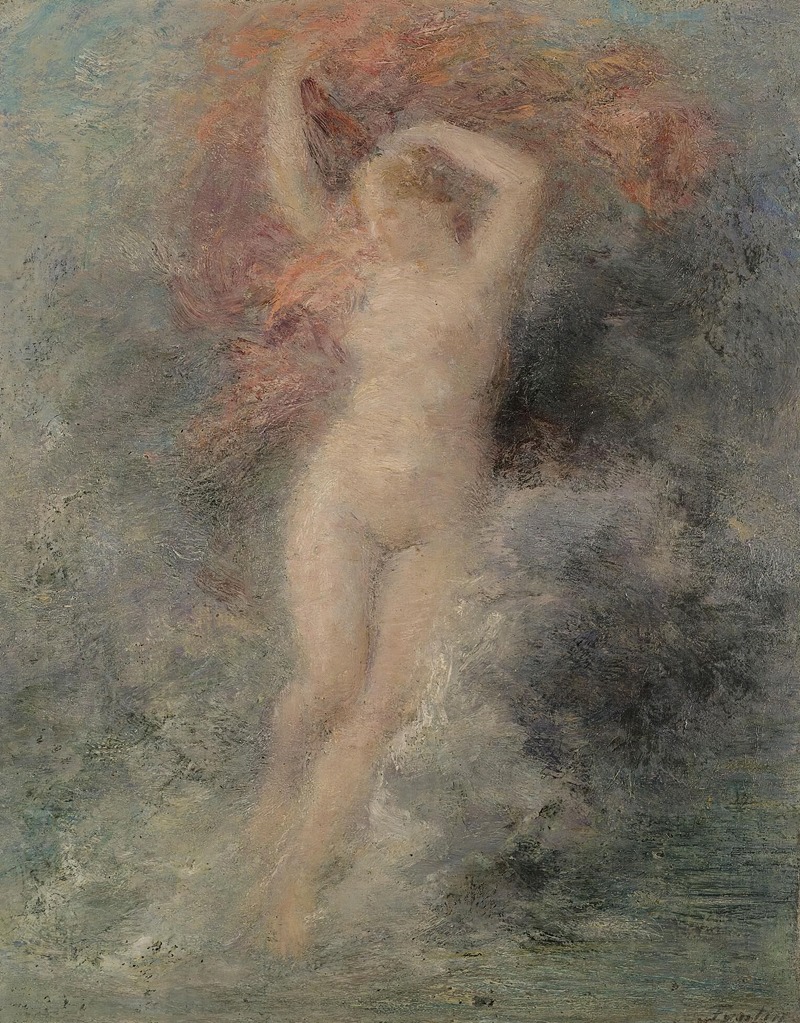
Venus S’elevant Au Dessus De La Mer
A hand-painted replica of Henri Fantin-Latour’s masterpiece Venus S’elevant Au Dessus De La Mer, meticulously crafted by professional artists to capture the true essence of the original. Each piece is created with museum-quality canvas and rare mineral pigments, carefully painted by experienced artists with delicate brushstrokes and rich, layered colors to perfectly recreate the texture of the original artwork. Unlike machine-printed reproductions, this hand-painted version brings the painting to life, infused with the artist’s emotions and skill in every stroke. Whether for personal collection or home decoration, it instantly elevates the artistic atmosphere of any space.
Henri Fantin-Latour, a renowned French painter known for his exquisite still lifes and group portraits, created the painting "Venus S’elevant Au Dessus De La Mer" (Venus Rising Above the Sea) in 1882. This work is a testament to Fantin-Latour's fascination with mythological themes and his ability to blend realism with imaginative elements.
Fantin-Latour was born in 1836 in Grenoble, France, and he developed a keen interest in art from a young age. He moved to Paris to study at the École des Beaux-Arts and became associated with several prominent artists of his time, including Gustave Courbet and Édouard Manet. Although he was contemporaneous with the Impressionists, Fantin-Latour maintained a more traditional approach to painting, focusing on precise detail and composition.
"Venus S’elevant Au Dessus De La Mer" depicts the Roman goddess Venus, a symbol of beauty and love, emerging from the sea. This theme is reminiscent of the classical myth of Venus Anadyomene, which describes the goddess's birth from the sea foam. In this painting, Fantin-Latour captures Venus with a sense of ethereal beauty, emphasizing her divine nature. The composition is carefully balanced, with Venus positioned centrally, drawing the viewer's eye to her serene expression and graceful form.
The background of the painting features a tranquil sea, rendered with soft, muted colors that contrast with the luminous figure of Venus. Fantin-Latour's use of light and shadow adds depth to the scene, enhancing the three-dimensional quality of the figure. The delicate brushwork and attention to detail are characteristic of Fantin-Latour's style, showcasing his technical skill and artistic sensitivity.
Fantin-Latour's interest in mythology and allegory is evident in several of his works, and "Venus S’elevant Au Dessus De La Mer" is a prime example of his ability to reinterpret classical themes through a contemporary lens. While he is best known for his still lifes and portraits, this painting highlights his versatility and his capacity to convey narrative through visual art.
Throughout his career, Fantin-Latour received recognition for his contributions to the art world. He exhibited regularly at the Salon in Paris and gained admiration from both critics and fellow artists. Despite the changing trends in art during his lifetime, Fantin-Latour remained committed to his unique vision, blending realism with elements of fantasy and imagination.
Today, "Venus S’elevant Au Dessus De La Mer" is appreciated for its beauty and craftsmanship, reflecting Fantin-Latour's mastery of technique and his deep appreciation for classical mythology. The painting continues to be studied and admired by art enthusiasts and scholars, contributing to Fantin-Latour's enduring legacy as a significant figure in 19th-century French art.


















